  | STRATÉGIES |  |
 | PROGRAMME & BUDGET |  |
 | OBJECTIFS |  |
 | INTÉGRATION DES: |  |
 | Gestion sur les résultats |  |

|  |  |
 |
Planification Stratégique
Le Thème fédérateur de la Stratégie à moyen terme de l'UNESCO pour les six prochaines années, (jusqu'à 2007) est: Contribution de l'UNESCO à la paix et au développement humain à l'ère de la mondialisation, par l'éducation, les sciences, la culture et la communication.
|
Documents
 | AWAY : Femme, Créativité, Diaspora et Dialogue Interculturel – Catalogue de l'Exposition d’art - by Various authors under the Direction of Ambassador Laura Faxas, Permanent Delegate of the the Dominican Republic to UNESCO
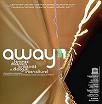 On the occasion of the 2007 International Women's Day celebrations at UNESCO, the Delegation of the Dominican Republic has brought together the works of ten of its women artists sharing a common denominator – their migration background. Today, the Dominican Republic has become an important place of origin, transit and destiny of migrants. Rosario Rivera Bond, Teresa Díaz, Iliana Emilia, Charo Oquet, Miguelina Rivera, Raquel Paiewonsky, Scherezade García, Natalia Ortega and Inés Tolentino live in New York, Athenes, Miami, Amsterdam, Paris and Montpellier but they all have great renown and influence within the Dominican contemporary art scene. They belong to a group of almost two million Dominicans residing outside of the island and they represent some of the countless Diaspora communities that are increasingly interconnected through extending transnational networks all over the world. This exhibition aims to inspire and open up an intercultural dialogue among the artists and with the general public, addressing the role of women in migration movements, Diaspora networks and intercultural dialogue. On the occasion of the 2007 International Women's Day celebrations at UNESCO, the Delegation of the Dominican Republic has brought together the works of ten of its women artists sharing a common denominator – their migration background. Today, the Dominican Republic has become an important place of origin, transit and destiny of migrants. Rosario Rivera Bond, Teresa Díaz, Iliana Emilia, Charo Oquet, Miguelina Rivera, Raquel Paiewonsky, Scherezade García, Natalia Ortega and Inés Tolentino live in New York, Athenes, Miami, Amsterdam, Paris and Montpellier but they all have great renown and influence within the Dominican contemporary art scene. They belong to a group of almost two million Dominicans residing outside of the island and they represent some of the countless Diaspora communities that are increasingly interconnected through extending transnational networks all over the world. This exhibition aims to inspire and open up an intercultural dialogue among the artists and with the general public, addressing the role of women in migration movements, Diaspora networks and intercultural dialogue.
Hans d'OrvilleContinuer |
 | Dialogue among Civilizations: Regional Summit on Inter-religious and Inter-ethnic Dialogue, Tirana, Albania, 9 and 10 December 2004 - by UNESCO/BSP
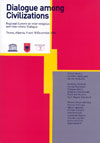 South-East Europe has suffered from the ravages of the last wars of the 20th century in Europe, also as a consequence of inter-ethnic and inter-religious tension, hatred and violence. Today, the region is rebounding, leaving the wounds of the past behind and responding to the desire of its peoples for reconciliation, exchange and cooperation, especially among the youth. Ensuring freedom of movement in the region will be an important practical step. In the present post-conflict period, there is an undeniable need to face up to the truth of the past as the region is not yet free from the seeds of divisions and confrontations of a religious or ethnic nature.Continuer South-East Europe has suffered from the ravages of the last wars of the 20th century in Europe, also as a consequence of inter-ethnic and inter-religious tension, hatred and violence. Today, the region is rebounding, leaving the wounds of the past behind and responding to the desire of its peoples for reconciliation, exchange and cooperation, especially among the youth. Ensuring freedom of movement in the region will be an important practical step. In the present post-conflict period, there is an undeniable need to face up to the truth of the past as the region is not yet free from the seeds of divisions and confrontations of a religious or ethnic nature.Continuer |
 | Dialogue among Civilizations - Proceedings of the High-Level Conference "Eurasia in the XXIst Century: Dialogue of Cultures, or Conflict of Civilizations?", Issyk-Kul, Kyrgyzstan, 10 and 11 June 2004 - by UNESCO/BSP
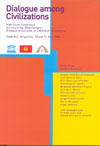 For centuries, Eurasia has been at the crossroads of continents, philosophies, ideologies, trade routes and geopolitical and strategic processes and interests. It has become home for diverse cultures, providing an environment within which the rich experience, aspirations and customs of nations can be effectively shared.Continuer For centuries, Eurasia has been at the crossroads of continents, philosophies, ideologies, trade routes and geopolitical and strategic processes and interests. It has become home for diverse cultures, providing an environment within which the rich experience, aspirations and customs of nations can be effectively shared.Continuer |
 | Africa but not only ... The first regional concert of "Mozart, but not only ..." - by Melody for Dialogues Among Civilizations Association
 "Africa, but not only" is our first regional concert. It is being organized in a continent which was engulfed in internecine wars and conflicts. Recently, much progress has been made to resolve previously interminable conflicts. Africa today is striving to embrace the wisdom of peaceful co-existence, the pursuit of good governance and the principles of cooperation and good-neighbourliness. The choice of the venue for this regional concert was therefore deliberate, namely to support the conflict-resolution and peace-making efforts under way in many sub-regions and countries. To be sure, much needs still to be done but let us begin to spread from here in Abuja this new message of peace.Continuer "Africa, but not only" is our first regional concert. It is being organized in a continent which was engulfed in internecine wars and conflicts. Recently, much progress has been made to resolve previously interminable conflicts. Africa today is striving to embrace the wisdom of peaceful co-existence, the pursuit of good governance and the principles of cooperation and good-neighbourliness. The choice of the venue for this regional concert was therefore deliberate, namely to support the conflict-resolution and peace-making efforts under way in many sub-regions and countries. To be sure, much needs still to be done but let us begin to spread from here in Abuja this new message of peace.Continuer |
 | Approved Programme and Budget, 2006-2007, (33 C/5) - by UNESCO
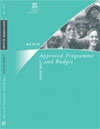 The Programme and Budget of the Organisation is a consolidated document outlining those funds which are appropriated by the General Conference of UNESCO and which are financed by contributions assessed on Member States and by Miscellaneous Income (if available), as distinct from the budget financed from extrabudgetary resources, e.g. voluntary contributions.Continuer The Programme and Budget of the Organisation is a consolidated document outlining those funds which are appropriated by the General Conference of UNESCO and which are financed by contributions assessed on Member States and by Miscellaneous Income (if available), as distinct from the budget financed from extrabudgetary resources, e.g. voluntary contributions.Continuer |
 | Dialogues: Au-delà des mots - by Etoundi Essamba, Angèle
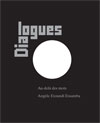 Les oeuvres d'Angèle Etoundi Essamba nous invitent à une observation rigoureuse , à une participation, et nous rappellent la nécessité de voir, de comprendre, et d'agir. Même si les photographies d'Essamba capturent un moment précis dans le temps, elles nous transmettent un sentiment d'éternité : elles nous incitent à voir les autres et nous-mêmes. L'Autre entre dans des DIALOGUES avec nous et nous dialoguons, en retour, sous différentes formes.Continuer Les oeuvres d'Angèle Etoundi Essamba nous invitent à une observation rigoureuse , à une participation, et nous rappellent la nécessité de voir, de comprendre, et d'agir. Même si les photographies d'Essamba capturent un moment précis dans le temps, elles nous transmettent un sentiment d'éternité : elles nous incitent à voir les autres et nous-mêmes. L'Autre entre dans des DIALOGUES avec nous et nous dialoguons, en retour, sous différentes formes.Continuer |
 | Voix de femmes, mais pas seulement... - by Association Mélodie pour le Dialogue entre les Civilisations
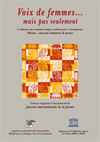 Un dialogue entre musiques classique, traditionnelle et contemporaine. Brochure du concert organisé à l’occasion de la Journée internationale de la femme. Un dialogue entre musiques classique, traditionnelle et contemporaine. Brochure du concert organisé à l’occasion de la Journée internationale de la femme.
Le spectacle est organisé et présenté par l’Association Mélodie pour le Dialogue entre les Civilisations.
Le concert a lieu à la Maison de l'UNESCO dans la Salle I le 8 mars 2006 à 19h30.Continuer |
 | Mozart, but not only... A dialogue between traditional, classical and contemporary music - by Melodies for Dialogue among Civilizations Association
 The “Mozart, but not only…” concert, organized on 16 November 2005 to mark the sixtieth anniversary of UNESCO, was one of the greatest and most beautiful moments of that day of commemoration… The concert represented an innovative and exciting approach: musical performances involving live interaction between traditional instruments played by musicians from different cultures, thus emphasizing that dialogue goes beyond words and can thrive in the realm of music. Such concerts give practical expression to a hallmark of UNESCO's Constitution, namely international cooperation. The dialogue between traditional, classical and contemporary music epitomizes the very essence of international cooperation in a field that is not often singled out in this context.Continuer The “Mozart, but not only…” concert, organized on 16 November 2005 to mark the sixtieth anniversary of UNESCO, was one of the greatest and most beautiful moments of that day of commemoration… The concert represented an innovative and exciting approach: musical performances involving live interaction between traditional instruments played by musicians from different cultures, thus emphasizing that dialogue goes beyond words and can thrive in the realm of music. Such concerts give practical expression to a hallmark of UNESCO's Constitution, namely international cooperation. The dialogue between traditional, classical and contemporary music epitomizes the very essence of international cooperation in a field that is not often singled out in this context.Continuer |
 | Glossary of terminology for the 33 C/5 and 2006-2007 UNESCO workplans SISTER Forms - by UNESCO/BSP
UNESCO's SISTER system requires Programme Specialists to enter certain information using specific terminology. The purpose of this Glossary is to provide appropriate definitions for the terminology used. The purpose of this glossary it to help define certain mandatory information requested by these web-based forms and has been developed in cooperation with Sectors/Services, thus allowing for the production of both programming and monitoring reports for internal purposes as well as for Member States (e.g. SSFs, RAMs, C/5, Workplans, EX/4, C/3).Continuer |
 | Programme et Budget 2006-2007, 33 C/5 Approuvé - by UNESCO
 Le document 33 C/5 approuvé indique les orientations et les cibles de l’action de l’UNESCO pour la troisième et dernière phase de la période couverte par la Stratégie à moyen terme pour 2002-2007 (31 C/4 approuvé). Partant, il a été conçu de manière à modeler cette action d’après les objectifs stratégiques, les thèmes transversaux et les effets recherchés du 31 C/4, en mettant à profit tout ce qui a été fait depuis 2002 - réalisations, résultats, évaluations et examens stratégiques, surtout en ce qui concerne l’éducation pour tous -, ainsi qu’à s’atteler aux tâches qui n’ont pas encore été abordées. Le document 33 C/5 approuvé indique les orientations et les cibles de l’action de l’UNESCO pour la troisième et dernière phase de la période couverte par la Stratégie à moyen terme pour 2002-2007 (31 C/4 approuvé). Partant, il a été conçu de manière à modeler cette action d’après les objectifs stratégiques, les thèmes transversaux et les effets recherchés du 31 C/4, en mettant à profit tout ce qui a été fait depuis 2002 - réalisations, résultats, évaluations et examens stratégiques, surtout en ce qui concerne l’éducation pour tous -, ainsi qu’à s’atteler aux tâches qui n’ont pas encore été abordées.
Ce document est également disponible en :
 | |  | |  | |  | |  Continuer Continuer |
 | UNESCO and the IYHF -- towards an active working partnership - by Hans d'Orville
The beginnings of the formal relationship between UNESCO and the International Youth Hostel Federation (IYHF) can be traced to April 2003 when UNESCO's Director-General, Koïchiro Matsuura and IYHF's President, Harish Saxena signed a Memorandum of Understanding (MoU). This MoU formalises and concretises the already existing partnership between both Organisations and provides a concrete framework for future cooperation. It provided for a new focus on a three-year Campaign for International Peace and Understanding, the annual celebration of International Youth Day (12 August - proclaimed by the UN in 1999) and awareness-raising activtities pertaining to HIV/AIDS in the context of preventive education.Continuer |
 | Final Report of the Director-General's Consultation of the National Commissions for UNESCO of the Europe and North America Region on the Preparation of the Draft Programme and Budget for 2006-2007 (33 C/5) - by UNESCO
While some participants were of the view that the unifying theme and the strategic objectives and sub-objectives of document 31 C/4 had been adequately reflected in 31 C/5 and 32 C/5, several others considered that more should be done to enhance the linkage between 31 C/4 and 33 C/5. In that context it was suggested that the C/4 and C/5 documents could be combined into a single document with a view to (i) offering a clear medium-term perspective for each biennial programme and (ii) allowing a better integration between the expected outcomes in the C/4 document and the expected results contained in related C/5 documents. Considering that the 31 C/4 was conceived as a “rolling” medium-term strategy, such a combined strategy and programme document was also seen to facilitate a more dynamic adaptation to changing circumstances.
Participants unanimously agreed, that in order to ascertain the linkage between strategy and programme, expected results should be carefully evaluated to assess whether the programme has achieved the objectives of the Medium-Term Strategy. Overall, there was general agreement that UNESCO should focus, in future planning, on practicing management by objective, setting a limited number of goals and having clearly articulated and measurable outcomes.Continuer |
 | Final Report of the Director-General's Consultation of the National Commissions for UNESCO of the Africa Region on the Preparation of the Draft Programme and Budget for 2006-2007 (33 C/5) - by UNESCO
At the invitation of the Government of Mozambique, the Director-General’ s Consultation on the draft Programme and Budget for 2006-2007 (33 C/5) was held in Maputo from Friday 14 to Tuesday 18 May 2004, with the invaluable logistic support provided by the Mozambique National Commission for UNESCO and the UNESCO Office in Maputo.
The main objectives of the Consultation were:
To invite comments and proposals from National Commissions on key principles, priorities and other issues related to the preparation of the Draft Programme and Budget for 2006-2007, based on a questionnaire prepared by the UNESCO Secretariat.
To hold thematic debates, as contribution to the elaboration of the Draft 33 C/5, on key issues of particular relevance to the Africa Region, especially the New Partnership for Africa’s Development (NEPAD).Continuer |
 | Illiteracy: a female phenomenon? - by Hans d'Orville
Powerpoint presentation given by the Director of the Bureau of Strategic Planning during UNESCO's celebrations of International Literacy Day, 10 Spetember 2002Continuer |
 | Strategic Thinking and Planning - by Hans d'Orville, Director, Bureau of Strategic Planning
Presentation by the Bureau of Strategic Planning to UNESCO's "Leadership and Change Management Programme" (LCMP) on Strategic Thinking and Planning.Continuer |
livre
 | Dialogue among Civilizations: International Conference in Vilnius - by UNESCO-BSP
This book represents the second publication in UNESCO’s Dialogue among Civilizations series. It contains the proceedings of a major event organized by UNESCO during the United Nations Year of Dialogue among Civilizations (2001).The Vilnius Conference brought together heads of state, political decision-makers and diplomats, distinguished scholars, academics and artists to debate about the complex issues of culture and civilizations in the contemporary world. Continuer |
 | Dialogue among Civilizations: Round Table on the Eve of the United Nations Millennium Summit - by UNESCO-BSP
Leaders from all continents assembled in September 2000 to share their views on the eve of the historic Millennium Summit. The ideas put forward during the Round Table show that a ‘dialogue among civilizations’ is an essential stage in the process of founding a form of human development that is both sustainable and equitable, humanizing globalization and laying the basis of an enduring peace. Continuer |
 | Globalization and Intangible Cultural Heritage - by UNESCO-UNU
"Our world's cultures are as extraordinarily diverse as they are vulnerable. Addressing the broad issue of culture in the context of globalization is thus a key component of UNESCO's work, but also a major challenge."
Koïchiro Matsuura Continuer |
 | Globalization with a Human Face -- Benefitting All - by UNESCO - UNU
“Globalization With a Human Face – Benefitting All” was the theme of the international conference organized by UNESCO and the United Nations University (UNU) in Tokyo, Japan, on 30 and 31 July 2003. This volume contains over 20 viewpoints on the driving forces and forgotten dimensions of globalization. International leaders probe the effects of globalization on cultural diversity, international dialogue, ethics, education, environmental policy and media. Continuer |
 | Les civilisations dans le regard de l'autre: Actes du colloque international - by
Ce colloque, organisé conjointement par l'UNESCO et l'Ecole Pratique des Hautes Etudes (EPHE), qui s'est tenu à Paris (France) les 13 et 14 décembre 2001 est venu clôturer l'Année des Nations Unies pour le dialogue entre les civilisations. Ce livre constitue le troisième volet de la collection UNESCO «Dialogue entre les civilisations», lieu de débats sur les cultures et les civilisations dans le monde actuel. Continuer |
 | Programme et budget approuvés, 2002-2003. (31 C/5) - by UNESCO
Le Programme et Budget approuvés de l'Organisation est un document consolidé qui décrit les fonds qui sont appropriés par la Conférence générale de l'UNESCO et qui sont financés par des contributions des Etats membres et par des Recettes Diverses (si disponible), à la différence du budget financé par des ressources extrabudgetaire, par exemple les contributions volontaires. Continuer |
 | Programme et Budget, 2004-2005, (32 C/5 Approuvé) - by UNESCO
Le Programme et Budget approuvés de l'Organisation est un document consolidé qui décrit les fonds qui sont appropriés par la Conférence générale de l'UNESCO et qui sont financés par des contributions des Etats membres et par des Recettes Diverses (si disponible), à la différence du budget financé par des ressources extrabudgetaire, par exemple les contributions volontaires. Continuer |
 | Stratégie à moyen terme -- 2002-2007 (31 C/4 Approuvé) - by UNESCO
This document represents, together with the Programme and Budget for 2002-2003 (31 C/5 Approved), the programmatic pillar of UNESCO’s reforms as approved by UNESCO’s General Conference in its resolution III/1, adopted at its 31st session held in October-November 2001. Continuer |
|

|
 RESSOURCES ASSOCIÉES RESSOURCES ASSOCIÉES |
 EN VEDETTE EN VEDETTE |
|
|


